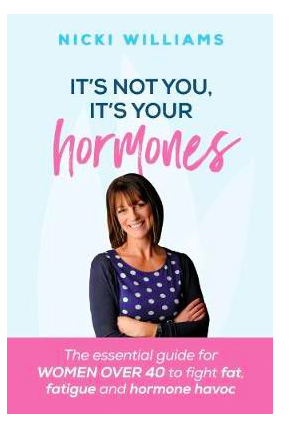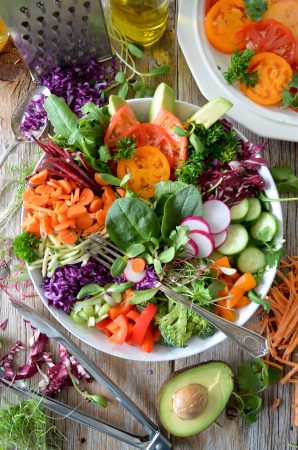From candles to mattresses, shampoo to tinned tomatoes, we may be unwittingly exposing ourselves to a daily cocktail of endocrine-disrupting chemicals (EDCs), which can slowly alter our delicate hormone balance.
That’s because there’s evidence to suggest that EDCs interfere with the body’s endocrine system – the network of hormones and glands that regulates our body.
‘I call them our invisible hormone- wreckers because these toxins can damage women’s four main hormones – oestrogen, thyroid, cortisol and insulin – affecting how we feel and perform,’ says nutritionist Nicki Williams, author of It’s Not You, It’s Your Hormones.

Image credit: Takealot
Research on EDCs in the body shows they do this by blocking natural hormones or tricking receptors to trigger a hormone response.
The good news? While we can’t eliminate EDCs, there are plenty of easy ways to help limit exposure. ‘I usually say to people, don’t let this overwhelm you, you don’t need to throw everything away,’ says Nicki. ‘With awareness, you can start to explore alternatives one product at a time. So, when you run out of your laundry liquid, for example, have a think about switching to a more natural brand instead.’
AT-HOME TWEAKS TO REDUCE CHEMICALS FROM HARMING YOUR HORMONAL BALANCE
✣ SWAP cleaning chemicals for natural ingredients, including baking soda, lemon or vinegar, or use E-Cloths which remove 99% of bacteria with water alone.
✣ SWITCH plastic wrap for reusable fabric dish covers. When heating up with a microwave, you can also cover food with another plate instead.
✣ DITCH old cookware for products with a toxin-free non-stick coating, such as the eco-friendly Risoli cookware range.
TAKE CARE WITH YOUR CANDLES
A scented candle can smell lovely, but a study* discovered that those made from paraffin wax release chemicals that cause poor indoor air quality.
TIP ‘You can now get lots of products made from essential oils,’ says Nicki. And look for soy and beeswax – try brands such as NEOM, Scentered and ESPA.
CHECK SHAMPOOS
Many contain the foaming agent sodium lauryl sulphate (SLS), normally sourced from parabens, which can mimic the action of oestrogen. Choose buys that are free from triclosan, a known endocrine (adrenal) disruptor – and look for products that are labelled as plant-based or organic. Download the Think Dirty app (free, IOS and Android) to see how your favourites score for toxins. And opt for ‘cleaner’ brands, such as Earthsap Pomegranate & Soy Shampoo by Faithful-To-Nature.
DITCH PLASTIC WATER BOTTLES
‘Bisphenol A (BPA), found in plastics, is the most widely found EDC – it’s even in your blood,’ says Nicki. ‘BPA contributes to thyroid disease, reproductive disorders, heart disease and liver damage. It’s mainly from plastic bottles, so if you stop drinking water out of plastic, then that will massively reduce your exposure.’
For a free and healthier alternative, turn on your tap. ‘Tap water is neutralised and then disinfected with chlorine, but it’s at very low, completely safe levels,’ says registered dietitian Aisling Pigott. ‘Some tap water contains fluoride, either naturally or added, and there’s evidence this helps prevent dental cavities. Again, it’s at safe levels.’
TIP Staying hydrated on the go? Stick to steel or glass bottles, rather than plastic reusables, to keep water levels topped up safely.
AVOID NON-STICK COOKWARE
Perfluorooctanoic acid (PFOA), a synthetic chemical used to repel grease and water, is found in some non-stick cookware. It can build up cumulatively in our bodies and has been identified as a hormone disruptor. ‘The surface of the pan can end up being absorbed into your food when heated to high temperatures,’ says nutritionist Dr Marilyn Glenville. TIP ‘It’s just as easy to cook with stainless steel, cast iron or glass cookware,’ says Dr Glenville.
PASS ON PLASTIC FOOD WRAP
Chemicals found in pliable plastics used for food wrap and food containers have been found to disrupt the hormonal systems. ‘Some experts advise a “better safe than sorry” approach – pointing to the rise in health problems, such as breast cancer and other oestrogen- dependent conditions like fibroids or endometriosis, which are possibly linked to these chemicals,’ says Dr Glenville. ‘If you buy food wrapped in plastic, remove the packaging when you get home.’
TIP Store food in a ceramic dish, greaseproof paper or a beeswax wrap.
WASH FRUIT AND VEGETABLES
‘Pesticides are big hormone disruptors, and are on all non-organic food produce. They’ve been linked to everything from neurological conditions to cancer, obesity, diabetes and many more hormone imbalances,’ says Nicki. Always wash fresh produce thoroughly before cooking or eating.
TIP ‘Go organic where you’re going to eat the skin, such as berries, apples and salad leaves, and save money when you’re going to peel them, like potatoes.’

Image credit: Unsplash
SWAP THOSE TINS
Most canned food cans are lined with BPA too. If you only make one swap – to glass, cardboard cartons or an organic brand that doesn’t use BPA – Nicki advises that you make it tinned tomatoes: ‘The acidity of the tomatoes can actually cause the BPA to leach from the can lining and then you ingest it.’
REPLACE THAT MATTRESS
‘Polybrominated diphenyl ethers (PBDEs), are in the fire retardants used on mattresses, sofas, carpet, furniture, electrical appliances, computers, paint and much more,’ says Nicki. PBDEs imitate thyroid hormones and disrupt their activity, are associated with fatigue, headache and irritability**.
TIP Nicki advises looking for mattress brands that use a non-chemical form of fire retardant, and using a HEPA-filter vacuum cleaner to remove toxic house dust.
Originally published in the April issue of SA Woman&Home Magazine.
ALSO SEE:
Feature image: Unsplash

